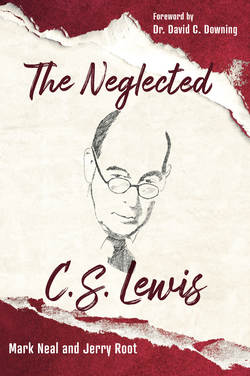Читать книгу The Neglected C. S. Lewis - Mark Neal - Страница 8
На сайте Литреса книга снята с продажи.
Introduction Why Neglected?
ОглавлениеCalling C. S. Lewis a neglected author would appear to be a contradiction, given the popularity of his works and their high level of awareness among Christians and non-Christians alike. One could argue that he is, in fact, more popular now than he was during his lifetime. His mainstream theological and apologetic works continue to be in high demand and The Chronicles of Narnia have joined the canon of classic children’s literature, not to mention the feature films of recent years that have made these works and Lewis a household name. There are more scholars writing about Lewis, more societies and groups springing up around Lewis’s ideas, and more books being published about him and his work, than ever before. So how do we justify this seemingly incongruous designation of “neglected”?
Within Lewis’s corpus of published work are fifteen books of literary criticism (depending on how you count them) that most people don’t know about or haven’t read. Even people who claim to know Lewis well are often not acquainted with them. This book examines eight of Lewis’s works of literary criticism. They deal with authors and literary periods that most people don’t read anymore, and they are drawn primarily from Lewis’s works in literary criticism, the area of his focused academic and professional work. Lewis was a fellow at Oxford University and later the Professor of Medieval and Renaissance English Literature at Cambridge University, and many of his literary loves and preoccupations are detailed in the pages of these books. So it is to these works that we apply the appellation of “neglected.”
One reason for their neglect, then, is that readers of Lewis simply don’t know they exist. Most mainstream attention focuses on the highly recognizable Lewis works such as his fiction and apologetics. While some of these more obscure works continue to be printed and available, others have slipped out of print and are only obtainable in rare editions or on superannuated library shelves where they sit and gather dust. They have suffered from a lack of promotion; that is, they have not been placed prominently before the reader of Lewis. Online searches of popular Lewis topics don’t often yield mentions of these works, and scholars, writers, and lecturers often don’t refer to them.
Another reason for this neglect is the difficulty of these works for mainstream audiences who don’t possess the specialized knowledge that Lewis presupposes in his writing. Many of these books began as lectures to students or groups who already understood the context of the literature. This made such lectures intelligible. It was entirely feasible for Lewis to assume that his auditors had read the works and authors on which he was discoursing or at least had a familiarity with them or the literary periods to which they belonged. For most of us now, this familiarity is entirely lacking, and this makes the reading of these books arduous and confusing. But if we are willing to learn and read slowly and do some research along the way, they will open their secrets to us.
Fascinatingly, Lewis himself wrote about neglected authors and literary periods. He engaged in what he termed rehabilitation, defending and/or reconceptualizing a period, genre, or author for which appreciation or critical understanding had been lacking. Thus, it is our goal to do for Lewis what he did for many authors and genres: dusting off his neglected books to bring them back into the arena of attention they deserve.
A lack of interest in the content of these works might be another reason why they are neglected. Because they primarily describe specific literary historical periods and their associated works of literature, it’s less an issue of them not being comprehensible as it is of them not being valued as worthy of study. In an age where the liberal arts are dwindling across college campuses in favor of more technical majors that presuppose to equip people better for the modern workplace, the kind of historical study Lewis advocates is not as appreciated as it once was. Our culture esteems actionable information over the kind of knowledge to be gained from reading the literature of another age. It’s a challenge, in an age where everything changes constantly and the pace of life seems ever-increasing, to think that old works of literature can matter in any substantial way. We tend to overvalue whatever is new and conflate this with progress. These are more difficult obstacles to overcome for the would-be reader of Lewis’s neglected works.
